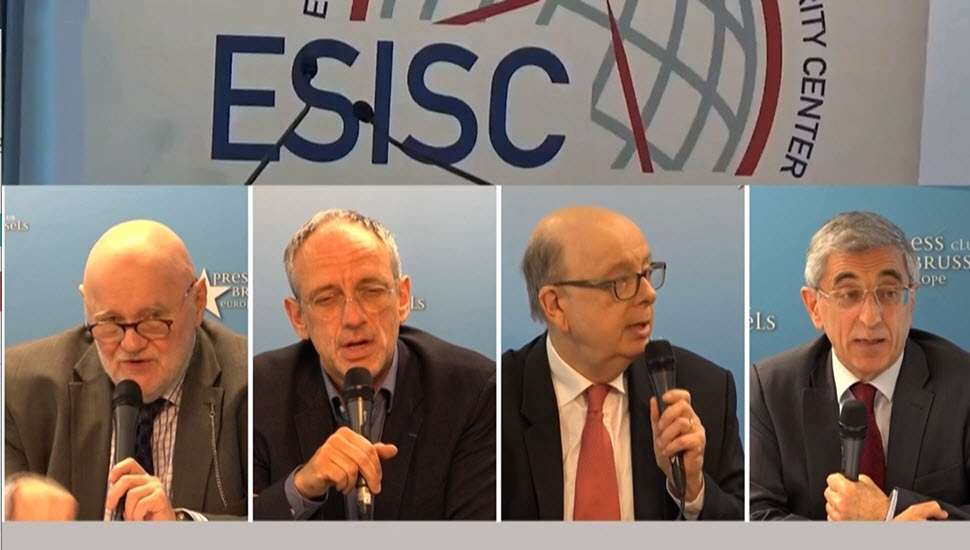
On Wednesday, April 26, 2023, a conference titled “Seven months after the uprising, is the regime of mullahs in Iran in power?” was held at the Press Club in Brussels at the initiative of the European Strategic and Security Information Center.
The speakers at the conference included Claude Moniquet, Director of the European Strategic and Security Information Center, Frederic Encel, Director of Research at the Paris Business School, Gerard Vespierre from the Middle East Studies Foundation, and Behzad Naziri, a member of the Foreign Affairs Commission of the National Council of Resistance of Iran (NCRI).
Claude Moniquet, Director of the European Strategic and Security Information Center
Claude Moniquet talked about two things in his speech: one was the diplomacy of the hostage-taking of the Iranian regime, and the other was the Blacklisting of the Islamic Revolutionary Guard Corps (IRGC) on the list of European terrorist organizations. He said that the diplomacy of hostage-taking is not a new practice by the Iranian regime, and it is not something that Belgium should accept. He added that the government has prepared a legal provision in complete secrecy that, if written in Tehran, is shameful if written by a Belgian. Furthermore, he talked about the exchange of prisoners, which allows the other party to pardon or release the exchanged prisoner and said that if this was not written by the mullahs, it was written by someone who really loved and sympathized with them.
He also said that it is possible to compare the IRGC to the SS (Nazi police). According to him, listing the IRGC on the European terrorist list is a necessity. He said that this is a necessity that must be implemented to send a strong message to the Iranian regime. He added that despite its demonstrations of power, the Iranian regime is weak. The more it shows its power, the more its weakness becomes apparent. Therefore, if someone has control over the situation in the country and society, the need arises for a democratic revolution in Iran.
Frederic Encel, Director of Research at the Paris Business School
The next speaker of the Brussels conference was Frederic Encel, the research director of the Paris Business School. He said, we are dealing with a regime in Iran that is a super suppressive regime. The change in direction of these regimes is generally towards an absolute totalitarianism, and this is what we have witnessed in Iran in recent years. That’s why I think it is more important than ever that all democracy supporters and humanists around the world, regardless of their political inclinations, maintain political and diplomatic pressure on this abhorrent regime.
Gerard Vespierre from the Middle East Studies Foundation,
In his speech, Gerard Vespierre of the Middle East Studies Foundation also stated, the economic situation in Iran is not due to the events of the past few days or months, or America’s withdrawal from the JCPOA.
Iran’s economic problem is a structural problem and related to the Islamic Republic regime coming to power. But beyond the economy, protests are a visible part of public anger in Iranian society. But there is an activity that is more important than protests, and that is the activities of insurgent groups. These are thousands of small groups of people (Resistance Units) organized by the People’s Mojahedin organization of Iran (PMOI/MEK), and we do not have enough information about them. Every day in Iran, they carry out actions such as putting up posters, distributing leaflets, or exploding and throwing Molotov cocktails at the repressive centers and institutions of the Mullahs and the regime’s judiciary, and ultimately destroying regime propaganda billboards.
Behzad Naziri, a member of the Foreign Affairs Commission of the National Council of Resistance of Iran
The last speaker at the conference at the Brussels Press Club was Behzad Naziri. He said, “The reasons that led to this rebellious situation in Iran, which has been going on for more than seven months, are, of course, due to two motivating forces: economic and social conditions and resistance activities. That is to say, today’s explosive conditions of Iranian society are due to a social depth that can be explained in this way: during these forty years, resistance activities have not been stopped; they have not been halted.”